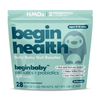Nurturing Infant Gut Health: What Parents Need to Know
share this article

The early years of a kid’s life are critical for establishing a healthy gut microbiome, which plays a vital role in their overall health and well-being. Studies show that the first 3 years of life can be a critical period for growth, which means that nutrition during this period is important for a healthy life as they grow. As parents, understanding the factors that influence infant gut health is essential for promoting optimal development and laying the foundation for a strong immune system. Let’s review what parents need to know about supporting infant gut health:
Importance of Breastfeeding
Breast milk is nature's perfect food for infants, providing essential nutrients, antibodies, and prebiotics that support the growth of beneficial gut bacteria and protect against infections. Exclusive breastfeeding for the first six months of life is recommended by leading health organizations to optimize infant gut health.
Avoidance of Antibiotics Unless Necessary
Antibiotic use in infancy can disrupt the balance of gut bacteria, potentially leading to long-term consequences for immune function and metabolic health. Whenever possible, limit antibiotic use to situations where they are medically necessary and follow healthcare provider guidelines.
Probiotics and Prebiotics
Probiotics are beneficial bacteria that can help colonize the infant gut and support immune function. Consider incorporating probiotic-rich foods or supplements into your little one’s diet, under the guidance of a healthcare provider. Prebiotics, found in breast milk and certain foods, nourish beneficial gut bacteria and promote a healthy gut microbiome.
Beginbaby Prebiotic and Probiotic combines prebiotic like HMOs and probiotics through bifidobacteria
Daily reads to help your little ones lead happier and healthier lives.
Join the
Happy Gut Club
Begin Health Expert Tip
HMO’s, or human milk oligosaccharides are the third most abundant component of human breast milk. What exactly are they and how do they benefit our kiddos? Our Begin Health Nutrition Expert answers this question here: Benefits of HMO’s for Kids.
Environmental Factors
Environmental factors, including mode of delivery (vaginal birth vs. cesarean section), infant feeding practices, exposure to pets, and early-life antibiotic use, can all influence infant gut health. Being aware of these factors and making informed choices can help support a thriving gut microbiome in your baby.
Summary
Infant gut health plays a crucial role in overall health and development, with factors such as breastfeeding, introduction of solid foods, avoidance of unnecessary antibiotics, and incorporation of probiotics and prebiotics all contributing to a healthy gut microbiome. By understanding and prioritizing these factors, parents can lay the foundation for optimal health and well-being in their children.
















